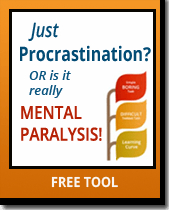 You may be suffering from the ADHD Superman Complex
You may be suffering from the ADHD Superman Complex
Last week I wrote about how so many people with ADD / ADHD were afraid to show their need to write down what they heard, even though doing so would be the logical thing to do. Often they said it was because they didn't want to seem weak, or didn't want it to look like they couldn't remember.
Today I heard from two ADHD coaching clients in the same day the phrase, “I didn't want to look stupid.” In both cases, they were referring to the reason they had for not asking for help on a project. In these cases, the kind of help they needed was NOT in an area where they could have reasonably been expected to know what to do.
Emily was a scientist who worked in an engineering laboratory, conducting experiments. Much of the experiments required using power tools and heavy machinery to build structures. Emily was a woman weighing 105 pounds. She was not an engineer, and her previous experience was in academia. She had never been taught how to use power tools.
She admitted that much of the procrastination and avoidance she showed regarding her projects had to do with fear of finding out all the parts of the projects that required massive lifting and construction. Although there is no way she could have carried out the physical aspects of the project by herself, she dreaded asking for help. Why? She was afraid of looking stupid.
- Is it “stupid” to not know how to operate powerful machinery that you're unable to lift, when you've had no exposure to it?
Mark was an assistant pastor, asked to develop a youth service for his church. This was his first job in the ministry. He was given only vague direction from the senior pastor, and a seemingly conflicting set of expectations from the youth program committee chairman. Because of this ambiguity, Mark took a long time to show the senior pastor his recommendations, which turned out not to be what was wanted.
Why didn't Mark clear up the ambiguity in the beginning instead of dragging his feet? He was afraid of looking stupid.
- Is it “stupid” to be unable to read your boss's mind, or to figure out conflicting directions in your first job?
Unless you were born with super powers, you cannot be expected to operate heavy complex machinery without help. You cannot be expected to read people's minds.
Were you born with super powers?
The belief that you “should” be able to do super feats on your own is a common pattern I've noticed with many ADD / ADHD Adults. Perhaps it comes from a history of feeling that we didn't know what we should have, leaving us inclined to believe others always know more about what to do.
To persist in applying an irrational assumption of what you “should” know is dangerous to your career! When you avoid asking for help or asking questions, you are sabotaging your success in doing the work that counts, in the areas where you have skills and talent. If the fear of looking stupid is keeping you from moving forward in your work, then you risk the very real danger of looking lazy or incompetent!
HINT: When you're avoiding asking for help, ask yourself WHY.
- Do you fear looking stupid? Ask yourself if someone in your position would REALLY look stupid for asking for clarification or assistance.
- Do you think it's something you should know? Ask yourself WHY you should know it. You may find your assumption defies logic.
Emily was hired to be a scientist, not a construction worker. Mark was trained to be a minister, not a mind-reader.
What were YOU hired to do? Are you avoiding doing it well for fear of asking for help? Take off that Superman cape; it's ok to be merely mortal.





Dee
Unbelievable .that adult who “doesn’t wanna look dumb”.that’s the same child in the classroom who was clearly axed by teacher if “everyone understands?”That child never put up their hand in fear of ridicule or looking dumb.Now he’s 51 and now look at the mess we”re in “Ollie”.ha ha
Melissa
Omg, YESSS! I lived that as a kid. And now being an adult, I am thankfully *not* afraid to ask questions, but I self-sabotage at every turn to avoid disappointing myself or looking stupid.
Bonnie Mincu
Melissa, try asking yourself “How stupid / weak might I look if I DONT ask my question?” Maybe that will help you evaluate the options before you automatically avoid.
Helene f
Today’s blog really strikes a nerve with me. Feeling stupid has been the black cloud that has followed me all my life, starting with public school and continuing through the first few months of college when I also felt really stupid and decided to drop out. Even trying to understand how to register for school was too much for me. I didn’t have the services that many young people have today. Many, many years later…. with lots of internal work and an understanding now of what ADD is all about, I rarely feel stupid in the same way I used to. It is not easy to get rid of this feeling and I suggest that all of us with ADD just be a little kinder to ourselves.
Bonnie Mincu
Amen to that! We are SO quick to blame or judge ourselves. It’s almost like we think if we judge ourselves FIRST, then no one else will criticize us.
Malkah Geller
I can iidentify with that. Except in my case I’ve been doing this job for 6 years. But I never learned or took the time to learn a basic good party presentation because I found that different people needed a different approach. I’m good with connecting on the spot and “winging” it (well not always). But I’m supposed to explain certain products in a fun way and when other consultants post their demos I love them but can’t remember them when I try to. I have a horror of memorization. When I do I lose my personal touch. But sometimes my demos suck and I know I could have higher sales if I only could figure out a way to memorize and still look authentic. This has been troubling me for 6 yrs now and I’m pretty frustrated.
Bonnie Mincu
Malkah, I’d love to help you with that!
Carol Monette
Thank you for this blog. This fear has been with me all my life. I can remember crying to my third grade teacher after school that I didn’t want to look stupid and have kids make fun of me during class when she asked if we had any questions concerning the arithmetic she had just explained. It does seem to take me longer than most people to understand simple concepts and instructions. I do take lots of notes but still seem to miss the main ideas.
Bonnie Mincu
I’m sure the traumas of childhood remain with us. Unfortunately, they can create exaggerated reactions as adults. Fear of looking dumb in front of a class of kids isn’t the same as privately asking for help or clarification when you weren’t given the information in the first place. It can be difficult to separate logic from feelings of shame from the past, but it’s worth practicing!
Vikki
There are several contributing factors to this for me.
First – I have a very high IQ & and excellent verbal skills and I cruised through the first few years of school picking things up by listening & never having to study. Then I hit the wall… the concepts were no longer simple but I didnt have the skills or focus to study. I am classically AD/HD but am female & too old to have been diagnosed in school. With puberty came hormonal changes & that made my already erratic attention even worse. I learned to work for hours when I was “on” and then struggle until the next “on”. I call it the shotgun theory of working. If I just keep shooting the pattern is wide enough to hit something. This takes a lot of energy which worked until I got into my forties and my unending energy started to flag due to age & (again) hormones.
Second – I have NO idea what is reasonable to ask about & what is not. I am always in ad-hoc situations and have no natural time-sense so I am not sure exactly what I am supposed to know & what my job should entail. I think I do but it somehow gets jumbled and then it is midnight & the project is due & I am exhausted & have no idea how I am going to get it finished or even how to start. (I have done the time sense exercise but that doesnt help with an unknown job)
It is like I can see steps 1, 2, and 3. I can also see steps 10, 11 & 12…. BUT steps 4 through 9 are a huge nebulous gooey mess.
Bonnie Mincu
Vikki, you explain it so well — and thank goodness are secure in your knowledge that you’re not stupid! I believe if you do more “Time Sense” you’ll get an understanding of how your OWN time sense is “off” and then can apply it to projections you make on how long it would take to do unknown tasks. Regarding not knowing what your job should entail… is there no one to ask — or is it up to you to define the job? I do believe the situation you describe is “coachable” if approached more deliberately.
Vikki
Thank you! I will do that. It seems that I muddle through doing more than is required. I have been working on my house lately and noticed that I MUST have all of the pertinent information about EVERYTHING surrounding what I am doing before I can do it. That takes tons of time. However, once I “get it”. It is there and I can apply that knowledge to other things. Installing the moulding took months the first time. Now, I can do it in no time BUT I remember how awful it was the first time & have a pavlovian response to doing it again. I have to keep reminding myself I learned & now can do it fast & well.
I think that the other thing has to do with shame. I “should” be able to do whatever, so I tend to think that I am wrong. In my last job, I finally saw a pattern. I know what I am doing but doubt myself, so I kill myself by not saying “No” and walking away from whatever. I am really good at automating Excel spreadsheets (cause I suck at data entry) BUT my last boss was awful at Excel & destroyed my work by writing over automated formulas then complained that the information wasn’t there or the spreadsheet didn’t work. I need to say “You hired me to do a job and yet you are not using my skills or trusting my judgement. Maybe you need someone else.”If I had done that in the last few jobs, before I destroyed my credibility by struggling to fix her messes and working 60 hours a week, we all would have been much happier & I would have gotten the support I needed. That part is on me.
Bonnie Mincu
Vikki – You’re doing well at noticing your own patterns! Yes, it’s easy to fall into a “pleaser” pattern of being overly accommodating to others rather than standing your own ground when you know you’re right. Regarding your boss messing up your spreadsheets, if you’d let her know that (nicely!), it would have done her a favor and educated her a bit on how to use Excel.
Vikki
Yep. First thing I did (and 2nd & 3rd) I even tried tracking her changes so I could see what she had done. She was having none of it. She was excellent with people but could not handle advanced excel. My replacement called a month after taking the job & offered it back to me saying the same thing. I politely declined. In hind-sight standing up for myself and leaving earlier would have been the best course. Live & learn.
Malkah Geller
Oh, Vicki, I can so well identify with you. You have explained it very well… you understand yourself much better than I. Often I can’t verbalize what’s going on… it’s all a jumble. But at least I do know now that I am quite intelligent and that age (I’m 64 and some health issues) prevent me from doing my Direct Sales business effectively, with focus and direction. If I had the energy, I could plow through with sheer hard work and willpower. But those don’t work anymore. I need to learn to work smarter, but with all that jumble in my head I don’t know where to start. Or shall we say it’s all a “huge nebulous gooey mess” as you say so beautifully :).
Mark Freedman
Over the years, I’ve noticed that people have become more sensitive to this. That’s probably why we often hear it said these days, “No question is a dumb question.” I think that although the feeling of looking stupid is more prevalent for ADD folk, most of us feel this way at one point or another.
Sometimes I feel this way when someone is explaining something to me, and nothing really registers even though I’m completely focused on what they’re saying. My mind then rewinds and replays what they say as they continue speaking. It’s an incredible struggle (and exhausting) trying to capture what they’re still saying, all the while rewinding and replaying what they just said in order to understand it. I equate this to re-reading the same paragraphs several times until I’m able to focus on it. But at least the book doesn’t continue on without me 😉
Bonnie Mincu
Mark, my thought is that instead of mentally replaying while they’re still talking, you might slow them down by paraphrasing. (“So,you are suggesting that I …..”) Or you could do my old trick, always have a writing pad with me to take down what people are saying. If you’re taking notes, they HAVE to slow down their explanation.
Malkah Geller
That’s a great suggestion, Bonnie. I must try that next time when people talk too fast or too convoluted. Thank you.
Billie
That sometimes we don’t know we can ask for help resonates with me. I have actually had several bosses who chastised me for taking notes in a meeting. Their stance was that I was to be listening. However, these were the same people who misquoted sometimes critical parts of the meeting, causing confusion and project delays. In these instances I erred on the side of continuing to take notes and wound up feeling greatly relieved. That has not completely shut down the super human wanna be in me, but it has gone a long way in supporting my human frailties. I, too, am too old to have been diagnosed in school, and today’s outlets are blessings. I am grateful we are all here.
Bonnie Mincu
I’ve had clients who have also reported their boss was ignorant enough to tell them that they “shouldn’t have to take notes.” I hope anyone who is told such a ridiculous thing will speak up and say something like, “I’ve learned that I retain information much better when I can write it down.” That is simply true for most people and there’s nothing “ADD” about it!
Mary Ann
I’ve learned to say two things when offered a somewhat shaming or uninformed opinion:
“Be that as it may… I’m taking notes.” Or whatever would fit the situation. AND…
“Your opinion is duly noted.” And continue taking notes.
Bonnie Mincu
BRAVO!
lm
“I’ve had clients who have also reported their boss was ignorant enough to tell them that they “shouldn’t have to take notes.” I hope anyone who is told such a ridiculous thing will speak up and say something like, “I’ve learned that I retain information much better when I can write it down.”
Since you’ve had more than one client report it, I’m guessing it’s a sufficiently common belief among bosses where people who respond like that are not exactly going to continue to be well-regarded — if they’re not outright chastised (sometimes publicly) — and might even be placing their job in jeopardy. It’s obviously a fairly common management belief.
Is there another suggested solution?
Bonnie Mincu
Hmmm, it’s hard to imagine anyone putting their job in jeopardy by saying they need to write things down. If they need to write something down, there’s no way to get around that. Either write down information or record it.
Malkah Geller
Amen to that, Billie!
Barbara
I strongly identify with Vikki’s description of her school experience and those “on” and “off” times: the high-attention marathons when something captures my interest, alternating with periods of total sloth when nothing seems to motivate me at all; and with Mark’s experience of listening but not grasping.
I find that even when I’m praised for doing good work, I feel very anxious about what I’m NOT doing, or not doing well. Sometimes it’s because I’ve genuinely experienced someone else doing it better, but sometimes it’s just because I can’t believe it’s that easy, or that what I’ve provided is all that’s needed. I began a master’s degree in teaching English as a second language, because students I taught as a volunteer said I was good at it, but I quit halfway through the program because I couldn’t come up with an idea for one assignment! My brain was blank — maybe the assignment was too open-ended or maybe I just couldn’t find a way into it that was interesting enough to spark an idea — anyway, I felt stupid and I thought that was always going to be a problem.
Bonnie Mincu
Sounds like a big shame issue. It was no big deal to feel your mind was blank for an assignment… I’m sure that happens to everyone. But the shame it caused you created a really negative consequence. Which is why I say that SHAME is often the a greater problem for many of us than ADD traits and habits.
Far better to learn how to fulfill an assignment even when you’re not inspired. Remember, most people are not creative or good at ideas, yet plenty of them get masters degrees!
Malkah Geller
Barbara, it’s uncanny how everyone’s post resonates with me in one way or another. I feel lots of emotion coming up when you write: “I find that even when I’m praised for doing good work, I feel very anxious about what I’m NOT doing, or not doing well.” This has prevented me from celebrating my successes because I just didn’t value them enough and I focused on the things that I had NOT done. So, what can we do about all this? I don’t want to be like this for the rest of my life. I want to grow, be successful in my career, become financially independent and all that good stuff.
Do you feel that you would have liked to finish your Masters? I had such a horror of test situations that my grades in oral tests were always bad because my brain would freeze… a few minutes after the test, I would always know ALL the answers. So frustrating!
lm
” In these cases, the kind of help they needed was NOT in an area where they could have reasonably been expected to know what to do.”
First, apologies for the necro remark.
Second – after several situations of this type and some contemplation of why this happens, I’ve come to think that part of the problem might be with both the definition of the word “reasonable”, and who it is in the situation who’s in the position to define it.
I work in an environment (professional, Wall Street-esque atmosphere) where the workload is frankly and admitted to being *un*reasonable, and the standard for being perceived as “smart” and “promotable” is whether or not an employee (or contractor) “can cope” with it.
By contrast, those who call it out as as unreasonable as it is, or collapse under the load irrespective of how unreasonable as it is, are labeled as those who “won’t be successful”, their work ethic is denigrated, and/or they are just flat-out eliminated – regardless of what documented contributions they might have made to the organization previously.
And as anyone who has tried to inconspicuously secure accommodations (or even observed anyone else trying to do it) knows, anything like that is going to label one a “troublemaker” which then has an adverse impact on trying to secure work elsewhere … because this isn’t necessarily an individual organizational problem so much as it’s (at least arguably) a cultural problem.
And in NYC (and similar cities – Boston, DC, Chicago, San Francisco) where work environments are frequently competitive but other differences are at least tolerated if not celebrated, and especially, as I think lots of people commenting (and maybe even running the blog) here might know, it’s not quite as simple as “just change jobs” or “just change cities” or “just get support”.
And if anyone is wondering why that is — just for one example, I think any ADHD adult who also happens to be female is going to be at least a little bit tired of the success stories of people like Marc Cuban and/or Sir Richard Branson and/or the president of Jet Blue, because those dudes are going to both feel and be perceived to be (even if culturally unconsciously, which tends to mean a lot of people are going to reflexively say “That’s not true!” before they sit down and think about it) entitled to reams of ongoing administrative (read: “space” organizational, “time” organizational, and deadline-oriented) support, in ways that women who suffer with the same condition are not.
Bonnie Mincu
I’m familiar with the Wall Street culture, and yes, it’s a problem! If someone can’t fit the standards of a work culture — no matter how unreasonable — perhaps they will not succeed in that environment. But if you are in that situation, at least you can be sure that the problem is not that you are “stupid!”
lm
” If someone can’t fit the standards of a work culture — no matter how unreasonable — perhaps they will not succeed in that environment.”
That sounds quite rational and reasonable.
But if every work environment in every city sufficiently diverse enough to hire fairly is like that, though – I’m not exactly sure how people who “don’t fit the profile” are expected to earn a decent wage (for example, enough not just for bottom-level survival, but for, say, CBT as well) …?
P.S. Sent a tollow-up email some weeks ago – I think the same week I wrote that first comment – looking for the Clutter-Free Guide that’s supposed to appear when we sign up for updates to the site? Still looking for that.